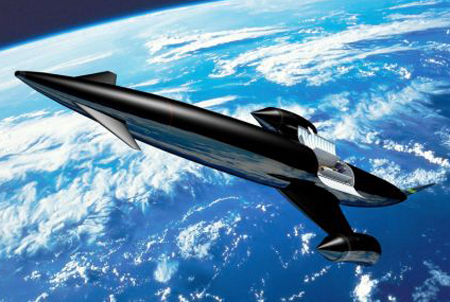Space aircraft coming soon
British engineers claim they will successfully build a special rocket engine capable of bringing the Skylon-powered aircraft straight into space.
The engineering team of Bristol University (UK) is part of the Skylon space flight specialist team. This is a type of aircraft capable of carrying satellite or cargo with a volume of up to 12 tons to orbit. It took off and landed on the same runway. Skylon's success depends on the Saber rocket engine that Bristol University's engineering team is working on.
The Saber is a unique type of engine because it has a mode of 'breathing' air when flying in the atmosphere and switching to jet propulsion when entering into space. When flying in the atmosphere, the engine draws air around it. Air is cooled and compressed before being fed into the jet engine with hydrogen. When it enters the vacuum environment in the universe, hydrogen is burned with liquid oxygen to create thrust.

Skylon space plane model.Photo: Daily Mail.
Alan Bond, the director of the Reaction Engines company under Oxford University, is leading the Saber engine project. He said: 'With a traditional single-use rocket engine, one has to spend more than 70 million pounds for a launch. With Saber engines, we can use rockets many times, so the cost will be reduced by 90%. In addition, it helps Skylon aircraft take off from an airport and rush into space. After completing the transport of goods, the space plane automatically returns to earth ".
Air cooling technology in the engine will be tested in the town of Culham, Oxfordshire county of England. Tests related to engine fuel combustion chamber will be conducted in Germany. Dr. Neil Taylor, the University of Bristol School of Aviation Engineering, will direct an experiment to prove that the new rocket is able to withstand atmospheric pressure around it.
'If a successful test will lead to a revolution in humanity's attempt to conquer space , ' Neil said. The success of the experiment will also pave the way for the complete construction of the Saber engine to conduct the first test of the Skylon aircraft. The University of Bristol engineering team said that the Skylon aircraft could take off in less than 10 years.
- 'Rocket aircraft' is for travelers who want to fly into space
- Coming soon to operate the first unmanned aircraft in the world
- China designed aircraft to take passengers to visit the universe
- Self-flying aircraft cracked
- The top-secret plane landed 780 days in orbit
- Why don't commercial planes fly higher into space?
- NASA tests space observation aircraft
- Unmanned aircraft take photos of marine ecosystems
- Mysterious US aircraft set a record of time saved space
- Shocked by US secret aircraft
- SpaceX successfully launched secret aircraft of the US Air Force
- Vietnam built unmanned aircraft
 Van Allen's belt and evidence that the Apollo 11 mission to the Moon was myth
Van Allen's belt and evidence that the Apollo 11 mission to the Moon was myth The levels of civilization in the universe (Kardashev scale)
The levels of civilization in the universe (Kardashev scale) Today Mars, the sun and the Earth are aligned
Today Mars, the sun and the Earth are aligned The Amazon owner announced a secret plan to build a space base for thousands of people
The Amazon owner announced a secret plan to build a space base for thousands of people